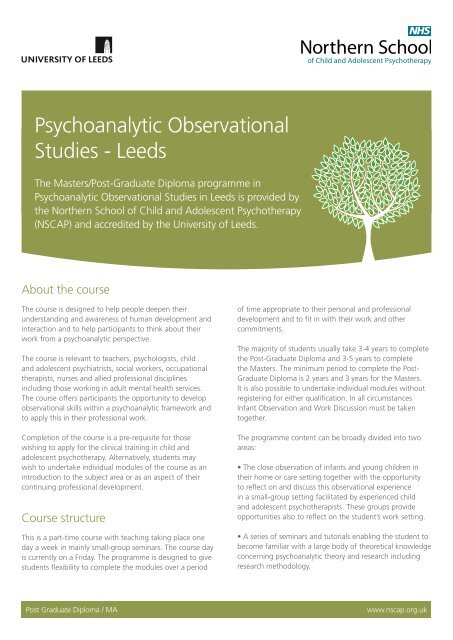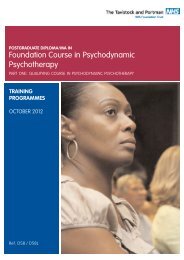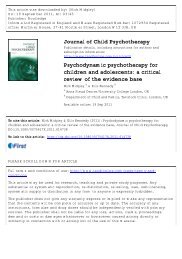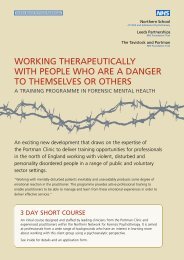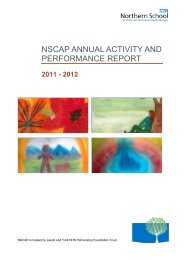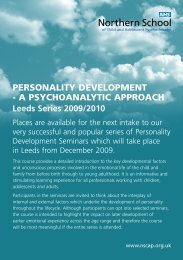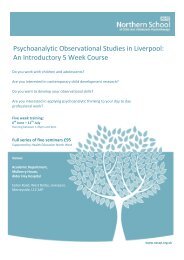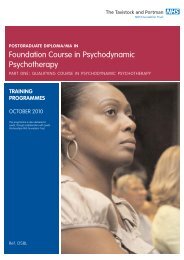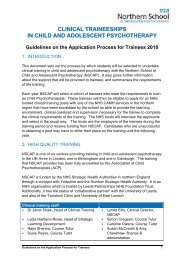Download - Northern School of Child and Adolescent Psychotherapy
Download - Northern School of Child and Adolescent Psychotherapy
Download - Northern School of Child and Adolescent Psychotherapy
You also want an ePaper? Increase the reach of your titles
YUMPU automatically turns print PDFs into web optimized ePapers that Google loves.
Psychoanalytic Observational<br />
Studies - Leeds<br />
The Masters/Post-Graduate Diploma programme in<br />
Psychoanalytic Observational Studies in Leeds is provided by<br />
the <strong>Northern</strong> <strong>School</strong> <strong>of</strong> <strong>Child</strong> <strong>and</strong> <strong>Adolescent</strong> <strong>Psychotherapy</strong><br />
(NSCAP) <strong>and</strong> accredited by the University <strong>of</strong> Leeds.<br />
About the course<br />
The course is designed to help people deepen their<br />
underst<strong>and</strong>ing <strong>and</strong> awareness <strong>of</strong> human development <strong>and</strong><br />
interaction <strong>and</strong> to help participants to think about their<br />
work from a psychoanalytic perspective.<br />
The course is relevant to teachers, psychologists, child<br />
<strong>and</strong> adolescent psychiatrists, social workers, occupational<br />
therapists, nurses <strong>and</strong> allied pr<strong>of</strong>essional disciplines<br />
including those working in adult mental health services.<br />
The course <strong>of</strong>fers participants the opportunity to develop<br />
observational skills within a psychoanalytic framework <strong>and</strong><br />
to apply this in their pr<strong>of</strong>essional work.<br />
Completion <strong>of</strong> the course is a pre-requisite for those<br />
wishing to apply for the clinical training in child <strong>and</strong><br />
adolescent psychotherapy. Alternatively, students may<br />
wish to undertake individual modules <strong>of</strong> the course as an<br />
introduction to the subject area or as an aspect <strong>of</strong> their<br />
continuing pr<strong>of</strong>essional development.<br />
Course structure<br />
This is a part-time course with teaching taking place one<br />
day a week in mainly small-group seminars. The course day<br />
is currently on a Friday. The programme is designed to give<br />
students flexibility to complete the modules over a period<br />
<strong>of</strong> time appropriate to their personal <strong>and</strong> pr<strong>of</strong>essional<br />
development <strong>and</strong> to fit in with their work <strong>and</strong> other<br />
commitments.<br />
The majority <strong>of</strong> students usually take 3-4 years to complete<br />
the Post-Graduate Diploma <strong>and</strong> 3-5 years to complete<br />
the Masters. The minimum period to complete the Post-<br />
Graduate Diploma is 2 years <strong>and</strong> 3 years for the Masters.<br />
It is also possible to undertake individual modules without<br />
registering for either qualification. In all circumstances<br />
Infant Observation <strong>and</strong> Work Discussion must be taken<br />
together.<br />
The programme content can be broadly divided into two<br />
areas:<br />
• The close observation <strong>of</strong> infants <strong>and</strong> young children in<br />
their home or care setting together with the opportunity<br />
to reflect on <strong>and</strong> discuss this observational experience<br />
in a small-group setting facilitated by experienced child<br />
<strong>and</strong> adolescent psychotherapists. These groups provide<br />
opportunities also to reflect on the student’s work setting.<br />
• A series <strong>of</strong> seminars <strong>and</strong> tutorials enabling the student to<br />
become familiar with a large body <strong>of</strong> theoretical knowledge<br />
concerning psychoanalytic theory <strong>and</strong> research including<br />
research methodology.<br />
Post Graduate Diploma / MA<br />
www.nscap.org.uk
Programme outline<br />
Module Frequency <strong>and</strong> duration Credits<br />
Infant Observation Weekly for 2 Years 40<br />
Work Discussion Weekly for 2 Years 40<br />
Young <strong>Child</strong> Observation Weekly for 1 Year 20<br />
Psychoanalytic Theory Fortnightly for 2 Years 20<br />
Personality Development Series 7 Seminars Included in Theory<br />
<strong>Child</strong> Development Research Fortnightly for 1 Year 15<br />
Postgraduate Diploma Min 2 years 120<br />
Dissertation Seminars <strong>and</strong> supervision 60<br />
Masters Min 3 years, Max 6 years 180<br />
Infant observation<br />
Students are required to observe weekly, for an hour, over<br />
a period <strong>of</strong> two years, babies growing up in their families,<br />
from birth onwards. Students will be advised <strong>and</strong> supported<br />
about how to find an infant to observe. Every observation is<br />
to be written up afterwards.<br />
Discussion takes place in small group seminars, (no more<br />
than 5/6 students per group) <strong>and</strong> this centres around the<br />
students’ written reports <strong>of</strong> their observational experience.<br />
Seminars run on a weekly basis for 1 1/4 hours duration.<br />
Young child observation<br />
Students are required to observe weekly a young child<br />
(under five years old) in his/her family setting or day care.<br />
Discussion in the seminar centres around the students’<br />
written reports.<br />
The aim <strong>of</strong> the seminar is to sharpen observational skills;<br />
to enrich knowledge <strong>of</strong> child development through direct<br />
experience. This is particularly in relation to a young child’s<br />
widening social experience <strong>and</strong> development <strong>of</strong> language -<br />
verbal <strong>and</strong> non-verbal communications with each other <strong>and</strong><br />
with adults.<br />
Work discussion<br />
This seminar runs concurrently with Infant Observation.<br />
The experience <strong>of</strong> work is studied through close<br />
observation <strong>of</strong> the behaviour <strong>and</strong> the emotional responses<br />
<strong>of</strong> both worker <strong>and</strong> clients/patients. The observational<br />
stance is therefore carried over into the study <strong>of</strong><br />
pr<strong>of</strong>essional interaction.<br />
Students bring detailed accounts <strong>of</strong> their work, from<br />
their varied pr<strong>of</strong>essional contexts. Attention will be paid<br />
to the worker’s settings, including the expectations <strong>and</strong><br />
the pressures <strong>of</strong> the institution in which they work, the<br />
experience <strong>of</strong> teamwork, <strong>and</strong> the worker’s own role within<br />
the team, with particular situations.<br />
Psychoanalytic theory<br />
This 2 year module consists <strong>of</strong> fortnightly seminars which<br />
aim to give students a critical underst<strong>and</strong>ing <strong>of</strong> the<br />
chronological development <strong>of</strong> psychoanalytic theory using<br />
a range <strong>of</strong> primary texts in psychoanalysis <strong>and</strong> to relate this<br />
to their work experience, <strong>and</strong> to their observational studies.<br />
The seminars are conducted as a group discussion <strong>of</strong> the<br />
text. This module essentially tracks in detail the historical<br />
development <strong>of</strong> psychoanalytic thinking.<br />
Post Graduate Diploma / MA<br />
www.nscap.org.uk
<strong>Child</strong> development research<br />
This is a fortnightly reading seminar over one year that<br />
aims to give a critical <strong>and</strong> sophisticated underst<strong>and</strong>ing<br />
<strong>of</strong> research concepts <strong>and</strong> techniques <strong>of</strong> classical <strong>and</strong><br />
contempary theories in child development. The seminars<br />
take the form <strong>of</strong> didactic teaching <strong>and</strong> group discussion.<br />
Students are given papers or texts to read in preparation for<br />
each seminar.<br />
Dissertation<br />
Students going on to complete the Masters will be<br />
required to complete a dissertation <strong>of</strong> 15,000 words. The<br />
topic for this dissertation may arise from any <strong>of</strong> the major<br />
components <strong>of</strong> the course, though most students will<br />
choose to develop either an observation study or a work<br />
based topic.<br />
Personality development<br />
This course takes the form <strong>of</strong> seven Saturday workshop<br />
style meetings. This is led by an experienced <strong>Child</strong><br />
Psychotherapist <strong>and</strong> the format includes a lecture<br />
presentation <strong>and</strong> a group discussion. Students will be<br />
invited to think about the interplay <strong>of</strong> internal <strong>and</strong> external<br />
factors which underlie the development <strong>of</strong> personality<br />
through the life-cycle: i.e. infancy, young child, latency,<br />
adolescence <strong>and</strong> adulthood. Participants may be invited to<br />
bring pr<strong>of</strong>essional clinical material from their work place.<br />
Programme staff<br />
Programme Lead<br />
Rajni Sharma<br />
University Moderator<br />
Alastair Cardno<br />
Course Administrator<br />
Amy Deakes<br />
Seminar Leaders<br />
S<strong>and</strong>ra Fentiman<br />
Karl Huntbach<br />
Mary Lindley<br />
Deborah Marks<br />
Susie Payne<br />
Rajni Sharma<br />
Course fees<br />
All students pay an annual registration fee <strong>of</strong> £580 (Year<br />
1 & 2) or £480 (Year 3 <strong>and</strong> subsequent years) <strong>and</strong> then a<br />
further £327 per year for each module taken, including the<br />
dissertation module. Therefore a student undertaking four<br />
modules at once would pay £1,888 for the year. A student<br />
taking two modules at once would pay £1,234 for the year.<br />
In addition there is a separate fee <strong>of</strong> £260 for the series <strong>of</strong><br />
Personality Development seminars which some students will<br />
have undertaken before registering for the programme.<br />
NSCAP operates a small bursary scheme that is designed<br />
to support a limited number <strong>of</strong> students for whom<br />
payment <strong>of</strong> the full fees may cause hardship. The bursary<br />
award is normally a reduction <strong>of</strong> fees by 25% or 50%.<br />
Application forms for the bursary will be made available to<br />
all c<strong>and</strong>idates.<br />
The closing date for bursary applications is 5th July 2013<br />
Year Registration Fee Annual Module Fee Total Fee<br />
1 £580 4 x £327 £1,888<br />
2 £580 4 x £327 £1,888<br />
MA £480 1 x £327 £807<br />
Personality Development Series £260<br />
Total for MA Dip over 3 years £4,843<br />
Post Graduate Diploma / MA<br />
www.nscap.org.uk
How to apply<br />
The next intake <strong>of</strong> students will be in September 2013<br />
Please visit:<br />
www.nscap.org.uk/content/courses-<strong>and</strong>-training<br />
for a link to the downloadable application form. The<br />
closing date for applications is Friday 22nd March 2013.<br />
Students are considered on the basis <strong>of</strong> application forms,<br />
references, relevant work experience, aspirations <strong>and</strong><br />
personal interviews. Students are required to be working<br />
in a pr<strong>of</strong>essional capacity with children, adolescents or<br />
families. They are generally expected to have had at least<br />
one year’s experience <strong>of</strong> such work in either an employed<br />
or voluntary capacity before commencing the course. This<br />
need not be in a clinical setting.<br />
Further information:<br />
Further information can be obtained from:<br />
Amy Deakes, Academic Services Officer<br />
NSCAP, Bevan House, 34–36 Springwell Road, Leeds LS12 1AW<br />
amy.deakes@nhs.net<br />
Telephone 0113 305 8750 Fax 0113 244 0966


